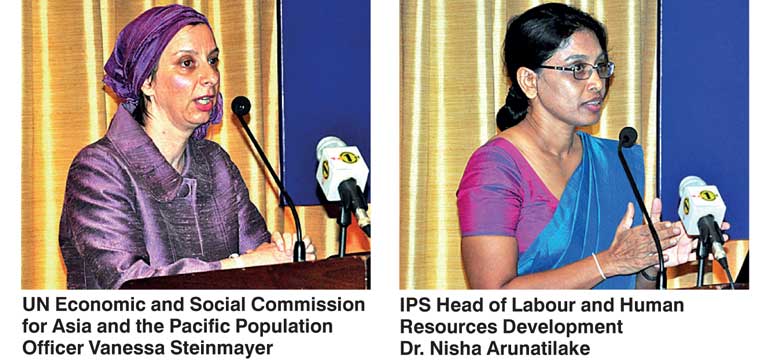Tuesday Feb 17, 2026
Tuesday Feb 17, 2026
Wednesday, 28 October 2015 00:05 - - {{hitsCtrl.values.hits}}

By Shannine Daniel
Sri Lanka needs to make strong reforms linked to the Government’s fiscal policy to encourage savings and improve inclusion of more people in pension systems, according to UNESCAP officials, as the country faces the challenge of a rapidly ageing population.
United Nations Economic and Social Commission for Asia and the Pacific Population Officer Vanessa Steinmayer referring to the existing pension systems in the Asia Pacific region including Sri Lanka noted they are highly fragmented, creating problems in fairness and sustainability.
In the Sri Lankan context, only 20% of older persons receive a pension from the public sector, whereas 5% receive from the Informal Sector and a further 5% receive from the Public Welfare Assistance Allowance (PAMA) and the Elderly Assistance Programme (EAP). Moreover 50% of the population does not receive any form of pension.
“Pensions play a vital role in the society, therefore they need to be one part of a comprehensive policy on population ageing which includes not only the provision of an adequate income but also provide affordable healthcare. Fiscal reforms are necessary to provide incentives for retirement savings continued. Thus one national pension fund with effectual regulation could certify better delivery and would enable better mobility between sectors and job categories.”
She made these comments at the National Consultation on Pensions in Sri Lanka organised by Institute of Policy Studies (IPS) and United Nations Economic and Social Commission for Asia and the Pacific (UNESCAP).
Steinmayer stressed there are grave challenges which need to be faced by the governments of the countries in this region in order to develop the existing pension systems.
“The system needs to be developed through reforms that improve sustainability and ensure future returns further on. Increasing coverage with regard to demographic developments will also be of great significance especially in countries which contain a large informal sector otherwise there will be no income security.”
She elaborated that there is also a need to look into the multi-tier system of the society which includes an increase of the coverage of the public pension system, enhancement of private pensions for higher income groups and a basic old-age pension for everyone. Ensuring old-age income security for women is also another challenge.
Further on Steinmayer highlighted that almost all Asia Pacific countries have a contributory pension system. However this is in most cases, only for the Public sector and the military.
“There are many other issues present in the pension systems in the Asian region. In many countries only a small proportion of older persons receive a contributory pension and it is mostly high income earners who receive it, in comparison to lower income earners. Despite the introduction of the universal non-contributory social pension for all older people, benefit levels is typically very low, too low to serve as an income source,” she opined.
In reference to the population, IPS Head of Labour and Human Resources Development Dr. Nisha Arunatilake commented saying that population is ageing swiftly which will result in the 60 years and above age category of the population to increase up to 19.7% by 2030, thus ensuring that older persons in the country have a significant level of income security is of great concern.
“This is mainly due to declining fertility rates, increasing life expectancy and the differences in the life expectancy of both females and males will result in future changes in the structure of the population, resulting in an older, more female population. As a result the existing pension schemes in the country may be unable to provide the adequate income support for all old persons living in the country.”
There are multiple wide spread pension schemes in the country; however the adequacy of the pension system depends on the lifestyle of the person receiving it, stated Arunatilake.
According to recent population projections, the share of people over 60 years in Sri Lanka will rise from 9% in 2001 to 17% by 2021. In addition, Sri Lanka’s population is expected to start declining by 2031, indicating that the share of the elderly will rise even further.
By 2051 the population over 60 years will be 29% and over 80 years 5%. This implies that increasing numbers of the elderly will become economically vulnerable, as family size further shrinks and a lower share of economically-active younger people become available to look after the needs of the elderly in the society over time.
Ageing-related poverty would result from the younger generation and State services being unable to bear the costs of supporting the elderly, in terms of their basic needs – food, clothing, shelter – as well as their other needs such as health, transport and recreation. Hence, the threat of many more elderly slides into poverty in Sri Lanka over the next few decades.
The situation is the same across Asia where the number of people age 65 and above is expected to grow dramatically over the next 50 years. For the region as a whole, the population in this age group will increase from 207 million in 2000 to 857 million in 2050. In such a situation pensions will become ever more important to the sustainable development of a country.
Pix by Sameera Wijesinghe